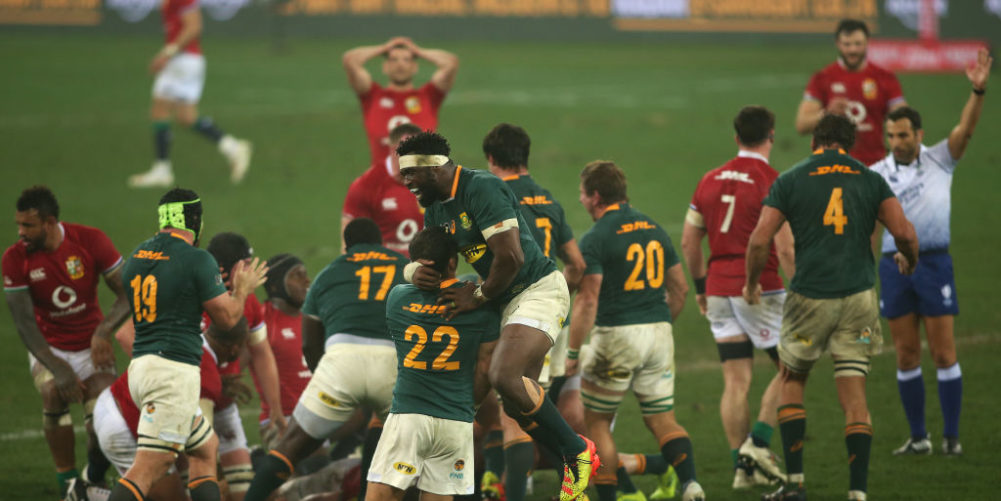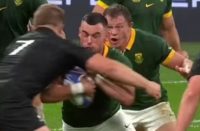An old story as told by the late Cliff Morgan sprang to mind when the Lions series began descending into a spiteful free-for-all.
What started with the Lions querying why Faf de Klerk hadn't been sent off during the A match and why Marius Jonker had been installed as TMO deteriorated from there. Every subsequent altercation added still more relevance to Morgan's anecdote.
It revolved around a decision during one of the all-time great Lions Tests, the opener against the Springboks before a then world record crowd of 95,000 at Ellis Park in August 1955.
The South African referee, Ralph Baumeister, awarded the teenaged Irish wing Tony O'Reilly a try, then saw a South African touch judge raise his flag and promptly disallowed it for a foot in touch.
“I didn't think Tony was in touch,'' Morgan said. “Nowadays, I suppose, there would have been hell to pay about it, people arguing with the referee and the touch-judge.
“I think rugby was the winner”
James Haskell
“Tony just walked away, and so did we all. And maybe that was the difference between the rugby that became professional and the rugby we played on tour. We wanted to play hard, wanted to win, but our attitude was basically carefree.
“Maybe we had scored that try, I don't know. But it didn't matter. It wasn't worth an argument. To me that game epitomised what rugby and the whole tour were about: adventure, style, passing the ball, taking chances.''
Warren Gatland's Lions gave all that kind of stuff the widest of berths, until circumstance forced them to try Finn Russell. Ironically, the daring Scot whom Gatland couldn't bring himself to pick as his starting ten almost won the series off his own bat.
Morgan's description of the Lions' philosophy in 1955, as recorded in his autobiography, shows how attitudes have changed. “We went on taking risks,'' he said. “Because when you play safe, the game is impoverished.''
How true. Gatland's risk-aversion ensured the Lions played too safe for too long and paid the price, losing the series without creating a single try behind the scrum.
In Johannesburg 66 years earlier, the Lions backs chanced their arm often enough to score four tries – one for each Irish wing (O'Reilly and Cecil Pedlow) one for England centre Jeff Butterfield and the other finished off by Morgan himself. No risk, no reward.
The Lions won 23-22 and those who were there talked about what they had seen for the rest of their days. And, at a cinema in rural West Wales, a tenyear-old boy watched brief highlights of the match on Pathe News.
His name was Gerald Davies and 16 years later he would score half of the six tries when the Lions beat the All Blacks over four matches for the first and only time. As an exercise in rugby evangelism, the series just ended will have been a non-event.
The ravages of Covid and outbreaks of domestic violence rendered this a tour like no other but in one sense that challenged both teams to lift the spirit by doing their utmost to make each Test a joyous occasion. At least the Springboks found some joy in winning, the Lions none.
Unlike their predecessors in the mid-Fifties, the Lions didn't walk away from an argument. By going public against Jonker's choice as TMO, they left the impression that because a South African was in such a position, the Lions would get less than a fair deal. They could have made their point while praising Jonker as a former Test referee of repute whose integrity was beyond question and left it at that. No harm done and, given the vagaries of human nature, the possibility that as the most honest of brokers, Jonker would unwittingly give the Lions the benefit of a doubt somewhere along the line.
Hamish Watson ought to have been binned for a dangerous tackle in the First Test, Duhan van der Merwe likewise in the Second before he went there for a trip. Not even the most oneeyed British or Irish fan could accuse Jonker of contributing to the Lions' falling short. The failure was entirely of their own making.
Like every other Lions tour of the professional era, this one ended with the same verdict, bemoaning the lack of preparation. Nobody seems to have pointed out that, for a change, their opponents were not only in the same boat but worse off.
Aggregate time for the three Tests: 337 minutes, 7 seconds.
Total penalty attempts: 32.
Time taken: 33 minutes, 56 seconds
Total penalties/free kicks conceded: 82 (by Springboks 40, Lions 42).
Total TMO referrals: lost count.
For obvious reasons far beyond their control, the Springboks had played one Test in 20 months since regaining the World Cup. Some had played none at all whereas the Lions had been hardened by the long weeks together during the Six Nations.
A claustrophobic existence restricted to a hotel room, team bus, training pitch and stadium cannot have been much fun but the pandemic gave the Lions an advantage none of their predecessors enjoyed. All three Tests at sea-level spared them from the lungburning pleasures at the rugby shrines of the Highveldt.
Selections and tactics have been widely questioned. Yet Lions' chairman Jason Leonard spoke gushingly when asked about Warren Gatland's reappointment for the next tour, as if it was the New Zealander's to turn down. Why the rush?



























